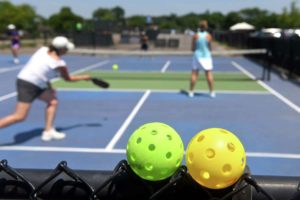Aug 30, 2022Pickleball Injuries Are On The Rise
For many Americans, the pandemic sport of choice was pickleball, a game played on a court that is part ping pong, part badminton, and part tennis. Highly social while being played both indoors and outdoors, it’s estimated that 5 million play the game regularly, and 10% of them started during the pandemic. Between 2019 and 2021, pickleball was the fastest-growing sport in the U.S.
As the popularity increases, so too do the injuries. This is likely since pickleball players (pickleballers?) tend to be over 50 (and 17 percent are over 65), and for many, they were largely sedentary before picking up their paddles, according to Stefanie Bourassa, Hartford HealthCare’s Sports Medicine clinical program director based out of the Bone & Joint Institute.
 “We are seeing lots of pickleball injuries across our sites,” Bourassa said, especially because Hartford HealthCare provides athletic trainers and medical services to both the Nutmeg State Games and the Connecticut National Senior Games. Patients range from beginners to professionals (yes, there are professional pickleballers).
“We are seeing lots of pickleball injuries across our sites,” Bourassa said, especially because Hartford HealthCare provides athletic trainers and medical services to both the Nutmeg State Games and the Connecticut National Senior Games. Patients range from beginners to professionals (yes, there are professional pickleballers).
Among the top ailments associated with pickleball are:
- Achilles’ strains or tears
- Shoulder problems
- Rotator cuff injuries
- Lower back problems such as disc injuries or muscle strains
- Lateral epicondylitis, commonly known as tennis elbow — now pickleball elbow
“It’s a fast-paced game, requiring a lot of quick reactions,” Bourassa said. “There’s not a lot of running, but there’s lots of quick pivots, lunging, rotating, and twisting. These motions can put a lot of strain on the body, especially when in a compressed position. If you were previously sedentary, you need to warm up.” Bourassa said ideally a new player should see a physical therapist in advance for an evaluation “so we can see how you move and we can prescribe specific drills and exercises to reduce your chances of injury,” she said.
If that isn’t feasible, then make sure you warm up before you play, she added.
The most common mistakes casual athletes make are to not:
- Hydrate in advance
- Stay hydrated during play
- Eat before play
- Increase heart rate before play (you should actually be sweating before you start)
- Stretch or activate muscle groups in advance (Bourassa recommends using bands to activate your knees, hips and shoulders, particularly the rotator cuff)
If you do get hurt while playing, Bourassa said an immediate assessment should be: Is this something you’ve previously experienced and know how to manage? Or is it a new pain or issue? If it’s new to you, stop playing immediately and seek medical attention.


